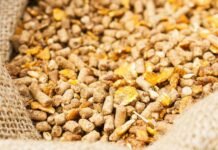Introduction:
Heat stress produces detrimental effect on production efficiency and meat characteristics in broilers. Trivalent chromium is an essential element in the animal body and is involved in carbohydrate, lipid, protein and nucleic acid metabolic function. Chromium is also a cofactor of insulin which promotes insulin activity and enhances amino acid uptake into muscular cells for protein synthesis. Stress increases urinary excretion of chromium and may exacerbate a marginal chromium deficiency. Dietary chromium supplementation has been reported to have a positive effect on meat quality and carcass traits of broiler chicks in natural or heat stress condition. One of the methods used to alleviate the effect of high environmental temperature on the performance of broilers is dietary manipulation with various agents. In this respect, trivalent chromium is added to the poultry diet because of the reported benefits of chromium supplementation for broiler chickens under heat stress and such conditions increase chromium metabolism in tissues, the product of which are irreversibly excreted through the urine.Trivalent chromium is a well-known essential trace element in human and other animals and is a component of glucose tolerance factor, which participates in glucose metabolism by enhancing the effect of insulin. Trivalent chromium improves insulin effectiveness by enhancing it’s binding to receptors and thus increasing the sensitivity of the target cell. Chromium from organic complexes such as chromium picolinate, nicotinate and high chromium yeast is absorbed more efficiently (by about 25-30%) than inorganic compound including chromium chloride (CrCl3), which are poorly absorbed (1-3%) regardless of the dose levels or dietary chromium status. Chromium-L-methionine is a newly available organic chromium source. Most feedstuffs are deficient in chromium and moreover its digestion and utilization in the digestive tract are low. The absorption and utilization of chromium may be dependent upon its association with organic molecules. One of the most absorbable and effective chromium compounds in the digestive tract is known as chromium picolinate.
Dietary chromium can increase lipoprotein lipase activity and eventually decrease the content of triglycerides rich lipoproteins. Dietary chromium can also increase liver LDL receptors, thereby reducing the LDL content and concomitantly the HDL proportion is increased. Chromium is also considered as anti-stress factor and increases immune capability. Chromium excretion may increase 10-300 folds in stress situations. This also becomes nutritionally important because in such condition, it is necessary to increase the trace element concentration in the diet. However, an appropriate recommendation on the chromium requirement for poultry has not been made NRC (1994), and most poultry diets are basically composed of plant origin ingredients which have usually a low content of chromium. Inorganic chromium such as chromic chloride and chromic oxide are poorly absorbed in animals; absorption ranges from 0.4 to 3 % or less, regardless of dose and dietary chromium status.
There are six known sources of organic chromium compounds:
i) Chromium-L-Methionine
ii) Chromium Nicotinate
iii) Chromium Chelate
iv) Chromium Proteinate
v) Chromium Picolinate
vi) Chromium Yeast
Researches on animals have confirmed that chromium from organic complex is absorbed more efficiently, about 25-30% more than inorganic compound. Brewer’s yeast is an example of natural chromium yeast. Typically, it contains approximately 2 ppm of organic chromium.Chromium is an essential mineral as well as integral component of an oligopeptide low molecular weight. Chromatin binding substance, chromodulin acts as part of the insulin signalling process across cell membranes. Stimulation of insulin’s action, which is directly proportional to the chromium content of the chromodulin, occurs without a change in the insulin concentration required for half maximal activity. Dietary chromium supplementation has showing positive effect on growth performance and feed conversion ratio in growing poultry. It improves immunological responses in broilers. In broilers, trivalent organic chromium supplementation results in improved growth rate, feed efficiency, meat yield and carcass quality with reduced carcass fat. Stress condition and disease occurrence increase urinary excretion of chromium and may exacerbate a marginal chromium deficiency. Organic sources of chromium can be absorbed 20-30% times than inorganic ones.
Metabolic effect:
Chromium stimulates the function of insulin through increasing insulin sensitive cell receptors. In Japanese quail supplemented with chromium, it was observed that there was an increased insulin and decreased corticosterone under heat stress. Increased supplemental chromium resulted in decreased serum corticosterone and increased insulin, consequently, serum glucose and cholesterol declined and protein concentration was elevated in heat stressed broilers.
Insulin regulates the metabolism of carbohydrates, proteins and fats, and stimulates the uptake of amino acids, protein synthesis and glucose utilization. Chromium supplementation decreases serum cholesterol and glucose concentrations in heat stressed Japanese quails. The improvement in the cholesterol profile may be due to an augmented insulin action that reduces lipolysis and increases the incorporation of fatty acids in the adipocytes or increases liver LDL receptors which results in reduced LDL and increased HDL concentrations. Chromium may have a role in improving cholesterol levels through facilitating the activity of lecithin cholesterol acyltransferase (LCAT), thus, accelerating the esterification and excretion of cholesterol. It reduces protein contents in the thigh muscle and decreases fat and cholesterol levels in broilers reared under heat stress conditions.
Antioxidant effect:
Environmental stress has been associated with the increased production of free radicals which damage cells and result in increased morbidity and mortality in poultry. Heat stress causes exhaustion of antioxidant reserves due to an increased level of lipid peroxidation in the serum and liver. Heat stress triggers the secretion of inflammatory markers such as interleukin-6-c reactive protein and tumour necrosis factor alpha (TNF-a).It has been postulated that lipid peroxidation is influenced by insulin metabolism and therefore, chromium may function as an antioxidant. In heat stressed Japanese quail, there was a decrease in serum MDA (malondi-aldehyde) when chromium was supplemented in the diet. Chromium pic supplementation in Japanese quail, increased serum vit-C and E and decreased MDA concentration in the serum, liver and muscles. A reduction in MDA levels is related to inhibition of epinephrine resulting from insulin tropic effect of chromium which consequently thwarts lipid mobilization.
Chromium-an essential nutrient:
Heat stress has been associated with depressed growth in meat type birds and a decline in egg production and quality in laying hens. During heat stress, feed intake tends to decrease, thus the availability of certain important minerals is reduced. Chromium (Cr) is one such mineral which is required for maintaining growth performance in poultry due to its role in growth, metabolism, and alleviationof lipid peroxidation. The available scientific literature on chromium has documented the beneficial effects of this essential mineral in improving poultry performance under conditions of environmental heat stress. Chromium is essential for the metabolism of carbohydrates, protein and lipids. In poultry, chromium intake is often negligible and its absorption is poor. Additionally, chromium levels are low in the grain used in the formulation of poultry ration. Under stressful conditions, the mobilization of chromium is increased from tissue and its excretion is increased, thus the demand for this mineral is further exacerbated. Heat stress adversely affects chromium status in poultry by decreasing its retention in serum and increasing its excretion. In addition, organic chromium has been found to have more beneficial effects in heat stress birds as compared to inorganic forms due to its increased absorption and bioavailability.
Growth and feed efficiency:
Protein digestibility is reduced by high environmental temperatures. Heat stress decreases the flow of nutrients from the crop down into the intestines and deactivates some important digestive enzymes like trypsin, chymotrypsin and amylase. Under high ambient temperatures, feed intake and growth rates are affected through arrested thyroid activity and oxygen consumption. Heat exposed birds reduce their feed intake to alleviate thethermogenic effect associated with impaired nutrient absorption, assimilation and utilization, leading to depressed productive performance in poultry. Inclusion of chromium in the basal diet of poultry was shown to improve the performance characteristics during period of heat stress.Increasing chromium (200-1200µg/kg) supplementation improved body weight, feed intake and feed efficiency in Japanese quail reared under heat stress (32.5°C). Chromium supplementation at the rate of 4-8mg/kg diet increased feed intake and feed efficiency in Japanese quail reared under high ambient temperature (34°C).Feeding 1500ppb chromium to broiler reared under heat stress conditions (33°C) increased weight gain and improved feed efficiency. Egg production, egg weight, shell thickness, specific gravity and Haugh units can improve when Japanese quail were supplemented with an inorganic chromium salt under high ambient temperature.
High ambient temperature reduces feed intake, live weight gain and feed efficiency; thus negatively influencing the performance of broilers. High ambient temperature also reduces thyroid activity in poultry. Plasma T3 and T4, important growth promoter in animals and are reduced at high temperature. In addition, heat stress stimulates the release of corticosterone and catecolamines and initiates lipid peroxidation in cell. During heat stress, plasma protein is reduced and markedly increased blood glucose concentrations. Such high ambient temperature results in decreases in serum vitamin and mineral concentrations in poultry as well as in human.
Conclusions:
Chromium supplementation helps in restoring the reduction in performance, productivity, nutrient digestibility, immune status and antioxidant profile as a consequence of exposure to heat stress. Hence, it is one of the very important components in the poultry feed during times of heat stress and thus, has a significant role to play in poultry production and performance during such a situation.
by Dr. SurajAmrutkar, SKUAST-J, Dr.SuhasAmrutkar, Parbhani Veterinary College
and Dr.BhartiDeshmukh, KCVAS








